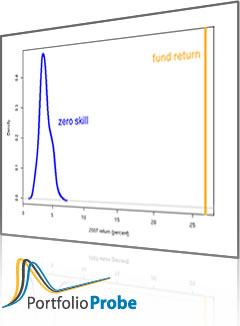Task
Generate random portfolios whose turnover from the existing portfolio is in a given range.
Preparation
This presumes that you can do basic random portfolio generation. For example, that you have mastered “Very simple long-only”.
- Portfolio Probe
You need to have the Portfolio Probe package loaded into your R session:
require(PortfolioProbe)
If you don’t have Portfolio Probe, see “Demo or Buy”.
Doing the example
- The objects:
priceVector,grossVal,curPortfolthat are defined in several examples, such as in “Passive, no benchmark (minimum variance)”
Doing it
We generate 1000 random portfolios with a limit on turnover (buys plus sells):
rpTurnover <- random.portfolio(1000, priceVector, long.only=TRUE, gross=grossVal, port.size=10, existing=curPortfol, turnover=c(21000, 32000))
We are forcing the turnover to be between 21,000 and 32,000 (dollars).
Remember that each time you execute this command, you get a different set of portfolios.
Explanation
The turnover argument takes a numeric vector of length two. The numbers are in currency units, and give the lower and upper limits on how much trading (buys plus sells) can take place.
You can give turnover a single number, in which case that will be the upper bound — the lower bound is understood to be zero.
Further details
It is possible to get the random trades rather than the random portfolios. All you need to do is use the out.trade argument:
ranTradeTurnover <- random.portfolio(1000, priceVector, long.only=TRUE, gross=grossVal, port.size=10, existing=curPortfol, turnover=c(21000, 32000), out.trade=TRUE)
This is precisely the same as the call that created rpTurnover except for the addition of “out.trade=TRUE“.
We can get the gross valuation of the random trades (that is, the turnover) with the command:
ranValTurnover <- valuation(ranTradeTurnover, priceVector, collapse=TRUE)
The minimum and maximum of the turnover are:
> range(ranValTurnover) [1] 21000.79 31998.76
Checking your work
We can see that turnover satisfies the constraints that we set by using the trade.distance function. First we create a vector of the value of the turnover for each random portfolio:
rpTurnTurn <- sapply(rpTurnover, function(x)
trade.distance(curPortfol, x, prices=priceVector,
scale=FALSE))
Now we look at the range of the turnovers:
> range(rpTurnTurn) [1] 21000.83 31998.50
See also
Navigate
- Back to “Random Portfolio Generation”
- Back to the top level of “Portfolio Probe Cookbook”
